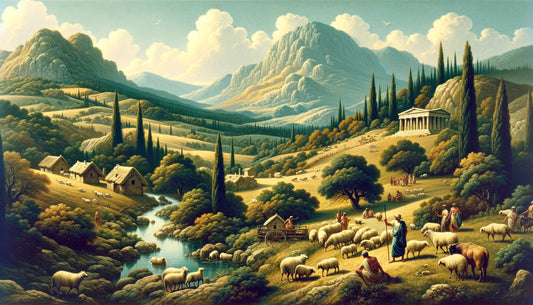
The Cretan Bull - Hercules' Seventh Labour
Continuation of the story The Stymphalian Birds.
Hercules returned once more, victorious, to the palace of Tiryns. In his last two encounters, King Eurystheus had already taken up residence in this city under Mycenaean rule. The satisfaction on the hero’s face was evident: he had completed all the labours he had been assigned, and given the magnitude of the feats, his joy was more than justified.
Without uttering a single word, he strode confidently towards the throne room. Once before the king, he knelt to receive his next command. Eurystheus, who hadn’t stopped watching him with a sideways glare from the moment he entered, already had his mission prepared:
“This time, you’ll travel farther than ever before, Hercules. Your seventh labour is to capture the Cretan bull alive and bring it to me!”
Hercules raised an eyebrow. He knew the legend of that creature well: a majestic and ferocious beast, its gaze clouded by fury, able to run like the wind and topple walls with a single charge. But behind this task, there was more than just a simple capture: the story of Crete was once again entwined with the will of the gods.
It was said that the bull had been a gift from the god Poseidon to King Minos, granted after his prayers, to impress his subjects. In return, the animal was to be sacrificed in honour of the sea god. But Minos and his wife, captivated by its beauty, decided to keep it alive. Offended by this disregard for their pact, Poseidon cursed the animal, filling it with uncontrollable strength and rage. Since then, the bull had brought chaos to the island’s fields, and some whispered that it was tied to other tragedies within the Cretan court—including the birth of the dreaded Minotaur.
With a defiant smile, Eurystheus added:
“So, I see you already know the tale. Then get going… before it lays waste to the entire island!”
Poseidon’s Trial
Hercules departed from Tiryns at first light, heading towards the port of Troezen. There, a merchant ship bound for the eastern Aegean Sea agreed to take him aboard in exchange for protection against pirates. The days at sea were long and monotonous, but the hero used the time to gaze at the constellations that had guided sailors for centuries.
On the fourth day, the weather shifted abruptly. Dark clouds blanketed the sky, and a sudden wind swelled the sails to their limit. Waves crashed against the deck as if Poseidon himself were testing him before setting foot on his island. Hercules seized the helm and, with his superhuman strength, kept the vessel steady until the storm subsided.
At last, Crete rose on the horizon. Steep mountains towered above the coastline, while the deep blue of the sea contrasted with the vibrant green of the olive groves. The port of Knossos bustled with life: sailors unloading fish, children playing along the docks, and women carrying baskets brimming with food.
Now on solid ground, Hercules had reached his destination. Before beginning his search for the bull, he decided to request an audience with King Minos as a gesture of respect.
King Minos’ Decision
The palace of Minos was a labyrinth of corridors, each adorned with frescoes depicting leaping bulls and ritual dances. The king, seated on an ivory throne, received Hercules with a calculating gaze.
“So, Eurystheus sends me his hero—for what purpose exactly?” said Minos. “You want to take my bull?”
“It is not yours,” Hercules replied firmly. “It belongs to the sea and the wind, and it is doomed to destroy everything while it remains here.”
Minos paused, reluctant to admit the truth. At last, he sighed.
“Perhaps you’re right… My finest men have long been unable to approach it without suffering fatal consequences. If you manage to capture it, it shall be yours. But know this—many have tried before you… and never returned!”
“I am well aware of what I face. I thank you for allowing me the chance.”
Hercules rose and left the palace, now fully determined to hunt down the fearsome beast.
The Battle of Strength
The first step was to follow the trail. Farmers spoke of a deep bellow echoing in the distance, of trees snapped as though a giant had passed through, flattened fields, and shattered irrigation channels. The enormous hoofprints led towards the mountains.
At last, one afternoon, as the sun bathed the sky in gold, Hercules heard it: a deep breath, like a muffled thunderclap. The bull emerged between two hills—its hide white as sea foam, its eyes blazing with fury, and its muscles rippling beneath the twilight glow. Its long, sharp horns gleamed like polished metal.
Hercules knew he could not kill it; Eurystheus wanted it alive. He drew his club and approached slowly, murmuring softly in an attempt to calm the beast. But just a few metres away, the bull went wild and charged with an earth-shaking force.
The hero dodged just in time, sending the bull crashing into a rock. He avoided two more charges, hoping exhaustion would soon take hold. When the bull began to wheeze heavily, Hercules launched himself upon it.
At first, the creature fought like a fury. But the hero managed to grip its horns and, in a contest of sheer strength, twisted its head until it toppled. They rolled across the ground and, just as he had with the lion and the boar, Hercules never let go—punches, bites, and headlocks to the neck and skull, until the beast, drained of strength, lay immobilised.
Then he tied its legs and neck with a thick rope, the knots strong enough to withstand any struggle. Even so, the bull bellowed and resisted, kicking up great clouds of dust.
Neither Pet nor Sacrifice
King Minos, surprised by Hercules’ victory and pleased to know the animal was still alive, kept his word and allowed him to take it. He knew he was losing the creature, but at least peace would return to his island.
The hero led the bull to the port, where it was loaded onto a large ship prepared for the journey. Throughout the voyage, the beast bellowed without pause, its calls oddly rhythmic, as if it were pleading not just for freedom, but also for help from its creator, Poseidon. Many sailors swore the sea moved to the same beat, and they soon feared the ship might capsize from the rocking waves.
Even so, they reached port safe and sound. Hercules continued overland to the palace of Tiryns. Once again, King Eurystheus jumped back in fright at the sight of the creature and hid behind one of the large stone jars.
“Ye–yes, I see you’ve captured it and that it’s very much alive. Get it out of my palace at once!”
“Are you sure you don’t want it as a pet? It’d make a fine bodyguard.”
“Out! I said out!”
Fear got the better of any other considerations. Hercules, obedient as ever, released the animal outside Tiryns, and it galloped off with force towards the east.
The seventh labour had been completed successfully.
Continues with The Mares of Diomedes.
Honouring the Legend
Hercules’ capture of the Cretan Bull is a feat of strength and cunning that still echoes through legend. To immortalise this challenge, we present you with this magnificent T-shirt that captures the majesty of the bull that once roamed one of the most enchanting islands in the Mediterranean.

As we cannot provide you with a sacred piece, we do not want to sacrifice any animal for a piece of clothing. All our items are 100% cotton and made with the utmost respect for the environment. LũM always aims to respect the flora and fauna of our planet.
Thank you for your trust, and may the adventure continue!
Reading list
- Labours of Hercules. Wikipedia, the Free Encyclopedia.
- Fry, S. (2018). Heroes. Penguin Books.
- Hamiltor, E. (1942). Mythology, Timeless tales of Gods and Heroes. Little, Brown and Company.
- Graves, R. (1955). The Greek Myths. Penguin Books.


